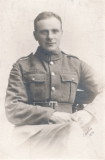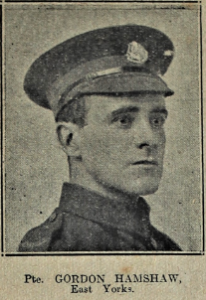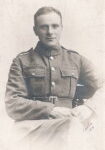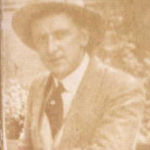

BORN HULL 02/02/1885. Son of John Hamshaw (1857-1936) and Elizabeth Briggs (1860-1901), of Hull and 30 Clifford Street, Hornsea. HE HAD ONE BROTHER, JOSEPH, KILLED IN 1918 AND ONE SISTER, GWENDOLINE (1887-1944). HE WORKED FOR FLOUR MILLS AS A TRAVELLING SALESMAN. DESCRIBED AS 5 FOOT, 8.5 INCHES TALL, 37-39 INCH CHEST, 137 LBS WEIGHT
HE MARRIED, HILDA COLVER (1889-1973), AT GAINSBOROUGH, LINCS, ON 01/11/1901. HIS WIFE HILDA (AKA “LILY”), LIVED AT, 158, LEA ROAD, GAINSBOROUGH, LINCOLNSHIRE, AND 70, DORSET STREET, GIPSYVILLE, HULL (ARMY ADDRESS) WITH THEIR CHILDREN, GLADYS, ELSIE & STANLEY.
HE ENLISTED AT SHEFFIELD, ON 15/12/1915. MOBILIZED ON 23/05/1916. TRAINED AT WITHERNSEA. POSTED TO FRANCE, ON 25/11/1916. SERVED AS A PRIVATE IN THE 5TH EAST YORKSHIRE REGIMENT. WOUNDED ON 03/05/1917 – GUNSHOT WOUNDS TO THE LEFT THIGH AND RIGHT HAND. RETURNED TO ENGLAND, ON 12/05/1917. DIED OF WOUNDS, AT MANCHESTER HOSPITAL, ON 11/06/1917, AGED 32.
HE IS BURIED AT GAINSBOROUGH GENERAL CEMETERY, LINCOLNSHIRE, UK, WHERE HIS WIDOW MOVED TO.
HIS ELDER BROTHER, JOSEPH HAMSHAW, SERVED IN THE ROYAL NAVY RESERVE, AS A DECK HAND ON HM MOTOR LAUNCH “276” AND WAS KILLED IN ACTION, ON 10/05/1918, AGED 35. HE IS BURIED AT DUNKIRK TOWN CEMETERY, FRANCE.
GIVEN A FULL MILITARY FUNERAL REPORTED LOCALLY (The news of the death of Pte. Gordon Hamshaw caused profound sorrow in Gainsborough. Quiet and unassuming, a gentleman in the truest sense of the word, he was everybody’s friend. A tenor vocalist of more than ordinary ability, he freely gave his services wherever he thought he could do good. When he gave that fine portrayal of the character of “Jack Rackstraw” in the local Operatic Society’s first performance, who would have dreamed that in a brief space of time he would have made he great sacrifice for his country. Gordon Hamshaw, when his country called for men, did not wait for conscription to come into force, but enlisted voluntarily in a well-known Regiment. That was in May, 1916, and in the following November he went abroad. He cheerfully endured the many hardships of the campaign, and took his share in all the big battles, being eventually wounded by shrapnel on May 3rd, 1917. He was sent to the military hospital at Manchester, where it was hoped he would make a satisfactory recovery. Such, however, was not to be, and despite the devoted nursing of his wife, -who is a trained nurse- he succumbed, as already stated, to his injuries. Mrs Hamshaw was with him to the last, and her presence was a great comfort to him. A few weeks ago his Colonel offered him a commission, but he refused the well-deserved compliment and preferred to remain a “Tommy,” an act typical of his unassuming character. Gordon Hamshaw entered the Army from a high sense of duty. This we know from a chat we had with him prior to “joining up,” when he announced his intention with the remark that “fighters were wanted, and fighters must be found.” He could have secured a commission then, but his opinion was that he could render the best service to his country as a plain fighting man, and he did his duty nobly. Private Gordon Hamshaw was the son of Mr.Hamshaw, of Hornsea, and prior to his enlistment was traveller for Messrs Kelsey. His wife was Miss Hilda Colver, and he leaves a child of four. The body was brought to Gainsborough on Tuesday evening, and in the presence of a large number of people was conveyed to 158, Lea Road. The funeral took place yesterday (Thursday) with military honours. A choral service took place in St. Johns Church, where for some time the dead soldier had been a chorister, conducted by the Vicar, the Rev. P. Clay. The church was crowded in every part. In addition to the 90th Psalm, the Russian “Contakion of the Departed” was sung, also the hymn “Jesus lives.” Mr. Penny presided at the organ and at the dose of the service played the “Dead March.” There was a large attendance at the cemetery to witness the Committal portion of the service. The coffin, draped with the Union Jack, was borne into the Church by a detachment of the D. Company, 4th Battalion, Lincolnshire Volunteer Regiment, from which the firing party – under the command of Lieut. Redfern – and the buglers, who sounded the “Last Post” over the grave were also furnished. The chief mourners were: – The widow (Mrs H Hamshaw), Mr. J. Hamshaw (father), Hornsea; Miss Hamshaw (aunt), Leading Seaman J. Hamshaw, R.N., (brother), Mr. Beauchant, Sheffield; Mr. and Mrs. Ernest Colver, Mr. and Mrs. Arthur Colver, Miss G. Colver, Nurses D and M Colver, Alfred Colver (Master), Private Harold Colver, Mr. and Mrs F. Hopthrow, Mr F. B. Colver, Sheffield; Mr and Mrs H. Wall, Mr Dickenson (Beckingham) and Mr. Naylor, representing Messrs Kelsey and Son. Major Kelsey attended the service at St John’s. A large number of wreaths was received, one of the floral tributes contained the following inscription, taken from the Gospel of the day on which he died: – “Greater love hath no man than this, that a man should lay down his life for his friend.” The inscription on the wreath from the hospital was: – “With deepest regret and sympathy from his fellow comrades, sister, and nurses in LII Ward, Military Hospital, West Didsbury, Manchester.” Other wreaths were received from: – “Our hearts’ love to a perfect sweetheart, husband, and daddy,” from Hilda and Rob; Father and Nell (Hornsea); Mrs Ridgway and Bee; Dad and Mother (Mr. and Mrs. Ernest Colver); Ken and Gwen; Peggy, Joe and Jack; Auntie Joe, Arthur and Hylda (Misterton); Uncle Fred, Aunt Nellie, and Harry; Percy and Kate; Uncle Walter, Auntie and Enid; May and Alec (Canada); Auntie Clappison and Enid; Sisters, Nurses, and fellow comrades at the Manchester Hospital; Office Staff at Messrs. Kelsey’s Trent Mills; Mr. and Mrs. H. L. Wall, Mr. and Mrs. J. E. Turner; Mr and Mrs. Neville and Family; Mr. and Mrs. Neville and Family; Mr and Mrs J. D. Johnson; Mr and Mrs Sammons; Wage Office Staff (Marshall, Sons and Co.); Jessie; Mr. and Mrs. Petner and Family; Mr. and Mrs. Cecil Keightley; Mr. and Mrs. Leonard Holmes; the St. John’s Church Choir; and others. We may add that a brother of the late Private Gordon Hamshaw gave up a good position to enter the Navy, and also refused a commission.

